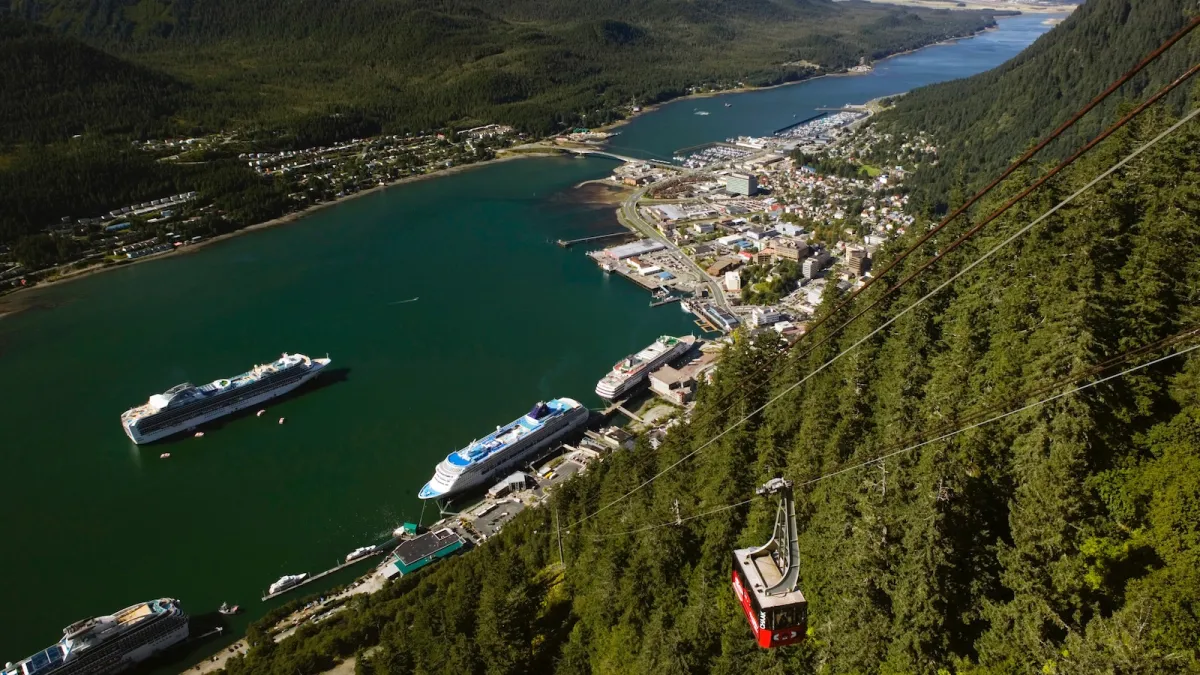Alaska’s breathtaking landscapes draw tourists, but the influx of visitors contributes to carbon emissions, exacerbating the challenges of climate change, notably visible in the shrinking Mendenhall Glacier. Juneau, a town of 31,000, has taken an innovative approach to counter this dilemma. Tourists engaged in activities like whale watching or glacier visits are asked to contribute a few dollars to the Alaska Carbon Reduction Fund. Instead of purchasing credits from distant offset projects, this nonprofit invests the funds in installing heat pumps for local residents, curbing fossil fuel usage.
The program, initiated in 2019, focuses on making a tangible impact locally. By installing heat pumps for residents like Kira Roberts, who previously relied on oil heating, the initiative addresses both emissions reduction and financial benefits. Despite recent skepticism about carbon offsets, the fund’s transparency and local focus provide a model that resonates with tourists and small businesses. The program’s success hinges on collaboration with regional companies, like Allen Marine, highlighting the potential for grassroots efforts to create a meaningful shift in addressing emissions challenges in popular tourist destinations.
The Juneau Carbon Reduction Fund’s Genesis and Mission
The genesis of the Juneau Carbon Reduction Fund dates back to 2019 when forward-thinking members of Renewable Juneau, an advocacy organization, envisioned a local solution to a global problem. Driven by the overarching goal of attaining 80% renewable energy by 2045, the fund emerged as a pioneer in its approach. Departing from the conventional model of investing in distant offset projects, the initiative channels contributions directly into installing heat pumps for Juneau’s residents. This distinctive strategy not only aligns with the city’s renewable energy objectives but also fosters community engagement. By focusing on reducing the reliance on fossil fuels at the grassroots level, the fund embodies a commitment to sustainable change that is both tangible and locally impactful. The Juneau Carbon Reduction Fund thus stands as a testament to the power of community-driven initiatives in addressing the urgent environmental challenges of our time.
Heat Pumps: A Local Solution for Global Climate Change
Amidst the challenges posed by global climate change, heat pumps have emerged as a potent local solution, playing a crucial role in mitigating environmental impacts. Specifically noteworthy in regions like Juneau, Alaska, where the delicate balance of nature is under threat, heat pumps offer an innovative and sustainable approach.
Juneau’s mild winters make it an ideal environment for the adoption of heat pumps. These devices harness emissions-free hydropower, aligning with the city’s commitment to reducing its carbon footprint. Unlike conventional heating systems reliant on fossil fuels, heat pumps contribute to a cleaner and more sustainable energy landscape. Residents, such as Kira Roberts, attest to not only the environmental benefits but also the significant financial savings achieved by making the switch.
Beyond individual households, the widespread adoption of heat pumps presents a scalable model for addressing global climate concerns. By embracing this technology on a broader scale, communities worldwide can contribute to the reduction of greenhouse gas emissions, thereby making a collective impact on the fight against climate change.
In essence, heat pumps symbolize the intersection of localized solutions and their broader implications for global environmental challenges. As communities increasingly recognize the importance of sustainable technologies, the adoption of heat pumps stands as a beacon of hope in the collective pursuit of a greener and more environmentally conscious future.
Transparency and Accountability in Carbon Offsetting
As the efficacy of carbon offset projects faces heightened scrutiny, the Alaska Carbon Reduction Fund stands as a paragon of transparency and accountability. In contrast to certain offset initiatives that fall prey to overestimating their environmental impact, this innovative fund adopts a meticulous approach. By leveraging three years of utility bills, the initiative precisely gauges the tangible reduction in oil consumption resulting from each heat pump installation.
The emphasis on localized data not only distinguishes the Alaska Carbon Reduction Fund but also fosters a sense of trust and connection for its donors. Rather than relying on abstract or distant metrics, contributors can tangibly understand the real-world impact of their support. This commitment to transparency not only builds credibility but also educates the community, making the carbon cost associated with each project both relatable and comprehensible.
In an era where skepticism surrounds carbon offsetting, the Alaska Carbon Reduction Fund’s dedication to accuracy and transparency sets a commendable standard. By aligning environmental goals with a commitment to openness, this initiative charts a course for responsible and effective carbon offsetting practices.
Challenges and Opportunities: Navigating the Offset Landscape
While successful in its mission, the Alaska Carbon Reduction Fund faces challenges, including a shortage of installers and hesitancy from major cruise companies to participate without third-party verification. The article explores the potential for expanding the initiative’s impact by including cruise ships and major airlines, thereby addressing a more significant portion of Juneau’s emissions.
Replication and Future Prospects: A Groundswell of Support
Despite hurdles, the fund’s executive director, Andy Romanoff, envisions the initiative as a model that could be replicated in other regions facing similar environmental challenges. In particular, he sees the potential for small businesses to rally support and create a groundswell that could influence major players like cruise companies. As the fund explores avenues for growth and replication, its unique approach offers hope for other communities seeking sustainable solutions. In conclusion, the Alaska Carbon Reduction Fund stands as a beacon of innovation, demonstrating that localized efforts can effectively combat climate change. By addressing the unique needs of Juneau and involving the community in carbon offset initiatives, this project provides a blueprint for a more sustainable future.

